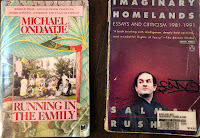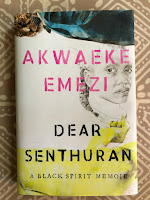I was very fortunate to present with Dr. Jessica Sanfilippo-Schulz in a talk for the World Food Programme's Family Liaison Outreach Community (FLOCK). Our work was on TCK and CCK memoirs.
Here are some of the books I spoke about and some I would have spoken about if I had had more time:
I started with Salman Rushdie's Imaginary Homelands (1981), which is essays not memoir per se. The titular essay, "Imaginary Homelands" has some lovely lines about geographic and temporal distance meaning that what is remembered as "home" is actually fictional. Rushdie is not strictly TCK, though definitely multiply displaced (India, Pakistan, The UK, years in hiding from the fatwa, the United States).
I paired him with Michael Ondaatje's family history Running in the Family (1982)--for Ondaatje, trying to piece memories together requires collaboration. Ondaatje is TCK (former Ceylon, now Sri Lanka, UK, Canada).
Akwaeke Emezi's memoir Dear Senthuran (2021) considers the result of multiple moves (nothing and no one seems real after a while). Here (as in their autobiographical novel Freshwater), Emezi is interested in the psychology of ogbanje. Their work makes me feel as though my brain is melting . . . a good thing in small doses. Emezi is Malaysian/ Sri Lankan/Nigerian/ American.
I ended with some words from Pico Iyer (card-carrying TCK). His Global Soul (2000) is iconic in writing about travel and dislocation.
And finally, Aminatta Forna's The Devil that Danced on Water (2002). I suspect her very recent The Window Seat would have excellent material too.
Ideally, especially for the World Food Programme audience, I would have liked to consider a couple of TCK travel narratives, perhaps jumping off from the award winning blogs listed on this site and my own work from years ago on that topic. Something I have yet to investigate is TCKs in international aid writing memoirs. I know those must exist, but haven't put the work into hunting them down yet. I can recommend non-TCK Jessica Alexander's Chasing Chaos: My Decade In and Out of Humanitarian Aid (2013) as an interesting starting point in that genre.
And what about Ottessa Moshfegh's amazing Homesick for Another World (2012). Short stories. Love them. Why have I not written about them yet?
In the FLOCK talk, I plugged my own book. Here it is:
It deals with seventeen TCK fiction writers, and has a good bibliography (c. 2013).
Gerald Durrell My Family and Other Animals was one of my favorite books when I was ten.








No comments:
Post a Comment